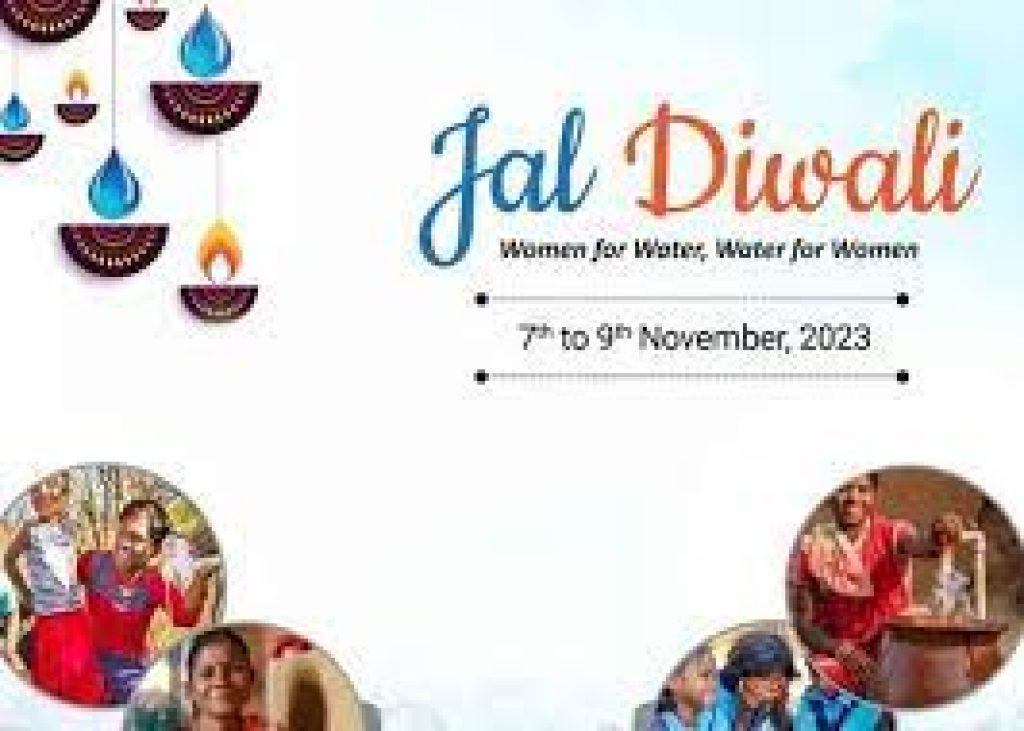Jal Diwali -“Water for Women, Women for Water Campaign” launched

The Ministry of Housing and Urban Affairs (MoHUA) is poised to introduce a groundbreaking initiative called the “Women for Water, Water for Women Campaign” in collaboration with the Ministry’s National Urban Livelihood Mission (NULM) and in partnership with the Odisha Urban Academy. This campaign, known as “Jal Diwali,” is scheduled to kick off on November 7, 2023, and run through November 9, 2023.
Objective: Inclusion of Women in Water Governance
The primary aim of the campaign is to provide a platform for the active participation of women in water governance. Women participating in the campaign will receive hands-on knowledge about water treatment processes through visits to Water Treatment Plants (WTPs) located in their respective cities. These visits will shed light on the critical procedures involved in delivering clean and safe drinking water to households. Additionally, the women will gain insight into water quality testing protocols, which are essential for ensuring that citizens receive water of the required quality. The overarching goal of the campaign is to instill a sense of ownership and belonging among women towards water infrastructure.
India’s Water Treatment Infrastructure
India boasts an extensive water treatment infrastructure with more than 3,000 Water Treatment Plants, designed to have a water treatment capacity of over 65,000 Million Liters per Day (MLD) and an operational capacity of more than 55,000 MLD. During the campaign, women from Self Help Groups (SHGs) will visit more than 550 water treatment plants, with a combined operational capacity exceeding 20,000 MLD, which accounts for over 35% of the country’s total capacity.
Empowering Women in Household Water Management
Women play a pivotal role in household water management. By equipping women with knowledge about water treatment processes and infrastructure, MoHUA aims to enhance their ability to ensure access to safe and clean drinking water for their households. The campaign has a broader objective of addressing issues related to gender equality by promoting inclusivity and diversity in sectors traditionally dominated by men.
“Jal Diwali”: Phase I of the Campaign
The inaugural phase of the “Water for Women, Water for Women Campaign,” known as “Jal Diwali,” is expected to witness participation from all States and Union Territories (excluding those under the Model Code of Conduct). More than 15,000 women from SHGs are anticipated to participate nationwide. The campaign will focus on the following key areas:
Familiarizing Women with the Functioning of Water Treatment Plants & Water Testing Facilities: Women participants will gain in-depth knowledge of the operations of Water Treatment Plants and the procedures for testing water quality.
Promoting Inclusivity & Involvement through Souvenirs & Articles Created by Women SHGs: The campaign seeks to encourage the active involvement of women through the creation of materials that raise awareness and promote inclusivity.
Familiarizing & Educating Women about the AMRUT Scheme & Its Impact on Water Infrastructure: Participants will be educated about the AMRUT scheme and its significance in enhancing water infrastructure.
Anticipated Outcomes
The campaign’s expected outcomes include increased awareness and knowledge of water treatment processes, a heightened sense of ownership and responsibility among women, the promotion of inclusivity, empowerment of SHGs, a positive community impact, and serving as a model for future initiatives.
Active Participation of State and City Officials
State and city officials from AMRUT and NULM will play a crucial role in facilitating these visits to Water Treatment Plants by identifying suitable locations. MoHUA has called upon all State and City officials to actively participate and support this initiative, marking a significant stride towards including women in the vital space of water infrastructure under AMRUT.
This innovative campaign not only serves as a means to empower women but also as a vital step towards ensuring clean and safe drinking water for households across the nation, thus contributing to overall social and gender empowerment. “Jal Diwali” holds the potential to be a milestone in promoting gender equality and inclusivity in water governance.